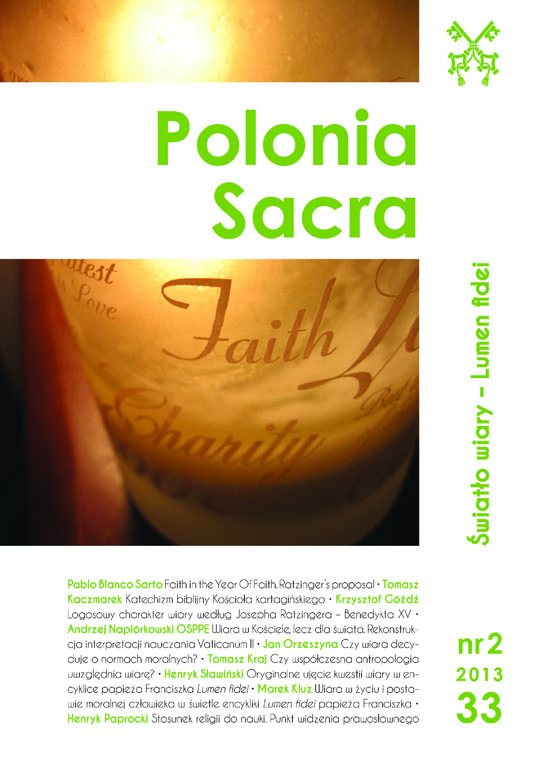Czy współczesna antropologia uwzględnia wiarę?
DOI:
https://doi.org/10.15633/ps.368Słowa kluczowe:
kultura chrześcijańska, osoba, konflikt antropologiczny, błąd epistemologiczny, scjentyzmAbstrakt
At present there are two predominant world outlooks on anthropology. On one side, there is Christian anthropology which takes faith into consideration. Taking faith into consideration means seriously considering such issues as: the linear concept of time, the Christian concept of man created in the image and likeness of God, the concept of human freedom, and the concept of human personhood rooted in metaphysics. The majority of contemporary anthropological positions reject the transcendent and metaphysical dimensions of the world, the existence of God, and the Christian concept of man. The main area of anthropological conflict is in bioethics. The main reason for the rejection of the Christian worldview is an infatuation with empirical science which results in categorical reductionism and scientism. It is said that empirical methodology is the only methodology which provides reliable knowledge about the world and man. The other reason for the rejection of the Christian concept of man derives from dualistic anthropology related to Descartes. It treats the human body as a raw material to be used to form the human being according to the ideas born in his/her mind. It may be particularly dangerous for man. The rejection of God and his plans for man exposes the latter to serious problems. To avoid them he should revise his epistemology and open himself to the integral truth about himself and the world. It is Christian anthropology based on the Christian faith which provides him this insight into truth.Pobrania
Opublikowane
2013-11-30
Numer
Dział
Artykuły tematyczne
Licencja
Prawa autorskie (c) 2013 Tomasz Kraj

Utwór dostępny jest na licencji Creative Commons Uznanie autorstwa 4.0 Międzynarodowe.
Autorzy publikujący w czasopiśmie udzielają jego wydawcy zgody o następującej treści:
- Autor zachowuje autorskie prawa majątkowe do utworu, a jednocześnie udziela wydawcy czasopisma zgody na jego pierwszą publikację w wersji drukowanej i wersji online na licencji Creative Commons Uznanie autorstwa 4.0 Międzynarodowe oraz zgody na wykonywanie opracowań, w tym przekładów.
- Autor ma możliwość udzielania zgody niewyłącznej na opublikowanie utworu w wersji, która ukazała się w czasopiśmie (np. zamieszczenia go w repozytorium instytucjonalnym lub opublikowania w książce), wraz z informacją o jego pierwszej publikacji w czasopiśmie.
- Autor może umieścić swój utwór online (np. w repozytorium instytucjonalnym lub na swojej stronie internetowej) jeszcze przed zgłoszeniem utworu do czasopisma.
Jak cytować
Kraj, T. (2013). Czy współczesna antropologia uwzględnia wiarę?. Polonia Sacra, 17(2), 85–96. https://doi.org/10.15633/ps.368

